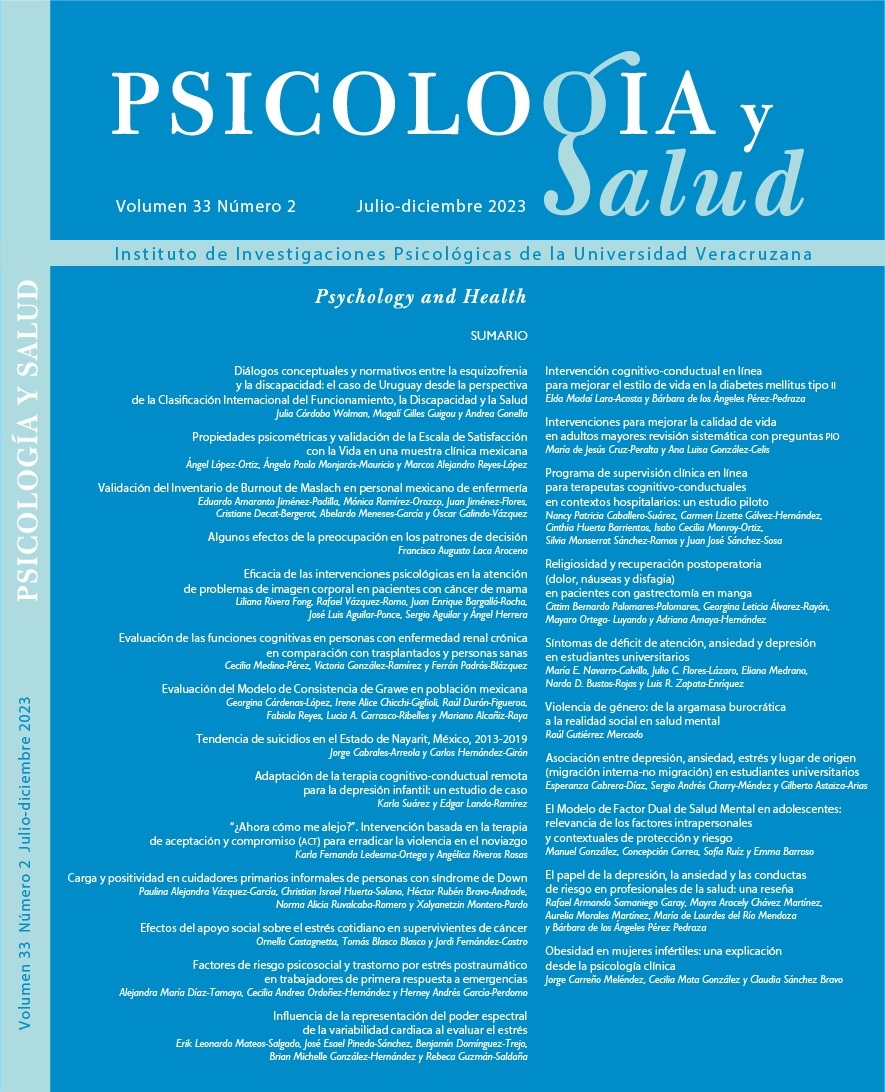Abstract
Background. Clinical supervision is essential for improving clinical skills in cognitive-behavioral psychotherapists who care for patients with chronic diseases in hospitals. Tele-supervision is a viable and safe alternative in the context of the SARS-CoV-2 virus pandemic. Objective. To evaluate the effect of an online clinical training and supervision model on the clinical skills of advanced, licentiate-level cognitive-behavioral therapists. Participants. The study included six psychotherapists in training who were advanced students of a university-based psychology licentiate training program. Method. The study used a pre-experimental design. Measurement included cognitive-behavioral knowledge tests, self-assessment, and role-playing clinical skills during clinical sessions. Cognitive-behavioral therapists with vast experience caring for patients with chronic diseases conducted the supervision. Before and after comparisons on training and online clinical supervision led to the main findings. Results. Regarding knowledge, a significant increase resulted in a scale evaluating the application of therapeutic principles and techniques. Direct observation and self-assessment revealed significantly increased clinical skills with large effect sizes (Cohen's d index> .80) for conceptualization, intervention, collaboration, briefing, feedback, effective use of time, and closure. Moderate effect sizes (Cohen's d index> .50) Increased diagnosis and treatment skills also increased presentation, framing, and understanding. Discussion. The present study of online clinical supervision shows favorable results in acquiring and improving clinical skills to care for patients with chronic diseases in hospital settings. Moreover, it highlights the effectiveness of virtual assessment tools and online supervision formats.
References
Abramson, A. y Fleming, N. (2021). Beneficios de la formación a distancia. APA Monitor, 52(6), 46-48.
American Psychological Association (2014). Guidelines for Clinical Supervision in Health Service Psychology. Washington: APA. Recuperado de http://apa.org/about/policy/guidelines-supervision.pdf.
Bajpai, S., Semwal, M., Bajpai, R., Car, J. y Ho, A. (2019). Health Professions’ Digital Education: Review of learning theories in randomized controlled trials by the Digital Health Education collaboration. Journal of Medical Internet Research, 21(3), e12912. Doi: 10.2196/12912.
Bell, D.J. (2020). Telehealth visits during the COVID-19 pandemic. Journal of Orthopaedic Experience & Innovation. Recuperado de https://journaloei.scholasticahq.com/article/12610.
Bell, D.J., Self, M.M., Davis III, C., Conway, F., Washburn, J.J. y Crepeau-Hobson, F. (2020). Health service psychology education and training in the time of COVID-19: Challenges and opportunities. American Psychologist, 75(7), 919-932. Doi: 10.1037/amp0000673.
Bernhard, P.A. y Camins, J.S. (2020). Supervision from Afar: Trainees’ perspectives on telesupervision. Counselling Psychology Quarterly. Advance online publication. Doi: 10.1080/09515070.2020.1770697.
Callegaro, J., Figueiredo, B. y Ruschel, D. (2012). Cross-cultural zdaptation and validation of psychological instruments: Some considerations. Paidéia, 22(53), 423-432. Doi: 10.1590/1982-43272253201314.
Cardiel R., M. (1994). La medición de la calidad de vida. En L. Moreno, F. Cano V. y H. García R. (Eds.): Epidemiología Clínica (pp. 189-199). México: Interamericana-McGraw Hill.
Cohen, J. (1988). Statistical power analysis for the behavioral sciences (2nd ed.). Hillsdate, NJ: LEA.
De la Rosa G., A., González P., M., Rueda T., J. y Rivera B., J. (2017). La práctica supervisada mediada por tecnología como escenario para la enseñanza de competencias clínicas. Hamut’ay, 4(1), 75-84. Doi: 10.21503/hamu.v4i1.1396.
Gonsalvez, C. y Crowe, T. (2018). Evaluation of psychology practitioner competence. The American Journal of Psychotherapy, 68(2), 141-272.
International Test Commission (2017). The ITC Guidelines for Translating and Adapting Tests (2nd ed.). Hemel Hempstead (England): ITC.
Johnston, K. (2006). Defining the nature and outcomes of Australian professional supervision: Applying holloway’s systems approach. Tesis doctoral. Queensland (Australia): Queensland University of Technology.
Kavanagh, D.J., Bennett-Levy, J. y Crow, N.A. (2002). A cognitive-behavioural approach to supervision. En M. McMahon y W. Patton (Eds.): Supervision in the helping professions: A practical approach (pp. 131-141). Sidney: Pearson Education Australia.
Maurino, L., Miranda, A.L., Moretti, L., Flores-Kanter, P.E., Casari, L. y Medrano, L.A. (2019). Evaluación de la competencia terapéutica: consistencia interna y acuerdo inter-jueces de la Escala de Terapia Cognitiva (CTS). Informes Psicológicos, 19(2), 95-107. Doi: 10.18566/infpsic.v19n2a07.
Molfenter, T., Heitkamp, T., Murphy, A.A., Tapscott, S., Behlman, S. y Cody, O.J. (2021). Use of telehealth in mental health (MH) services during and after COVID-19. Community Mental Health Journal (Advance online publication). Doi: 10.1007/s10597-021-00861-2.
Morris, S.B. y DeShon, R.P. (2002). Combining effect size estimates in meta-analysis with repeated measures and independent groups designs. Psychological Methods, 7(1), 105-125. Doi: 10.1037//1082-989X.7.1.105.
Pratt, K.J. y Lamson, A.L. (2012). Supervision in behavioral health: Implications for students, interns, and new professionals. The Journal of Behavioral Health Services & Research, 39(3), 285-294. Doi: 10.1007/s11414-011-9267-6.
Rakovshik, S.G., McManus, F., Vazquez-Montes, M., Muse, K. y Ougrin, D. (2016). Is supervision necessary? Examining the effects of internet-based CBT training with and without supervision. Journal of Consulting and Clinical Psychology, 84(3), 191-199. Doi: 10.1037/ccp0000079.
Rodríguez D., G.D., Reyes, E. y Cepeda H., P.S. (2020). Experiencias y consideraciones para el adiestramiento clínico en programas de psicología profesional en tiempos del COVID-19. Ciencias de la Conducta, 35(1), 119-156. Recuperado de https://www.researchgate.net/publication/347522655_Experiencias_y_Consideraciones_para_el_Adiestramiento_Clinico_en_Programas_de_Psicologia_Profesional_en_tiempos_del_COVID-19.
Sabra, Z.E.I. y Daigham, A.I. (2021). The effect of cognitive behavioral therapy training program on reducing emotional and social distress: Three years follow up. International Journal of Science Annals, 4(1), 16-21. Doi: 10.26697/ijsa.2021.1.3.
Sánchez R., S.M. (2021). Supervisión en terapia cognitivo conductual: diseño de una prueba. Tesis de Licenciatura. Ciudad de México: Universidad Nacional Autónoma de México.
Souza, C.L.E., Mattos, L.B., Stein, A.T., Rosário, P. y Magalhães, C.R. (2018). Face-to-face and distance education modalities in the training of healthcare professionals: A quasi-experimental study. Frontiers in Psychology, 9, Article 1557. Doi: 10.3389/fpsyg.2018.01557.
Tarlow, K.R., McCord, C.E., Nelon, J.L. y Bernhard, P.A. (2020). Comparing in person supervision and telesupervision: A multiple baseline single case study. Journal of Psychotherapy Integration, 30(2), 383-393. Doi: 10.1037/int0000210.
Young, J. y Beck, A.T. (1980). Cognitive Therapy Scale rating manual (Unpublished manuscript). Philadelphia, PA: University of Pennsylvania.
Worrall, J.M. y Fruzzetti, A.E. (2009). Improving peer supervisor ratings of therapist performance in dialectical behavior therapy: An Internet-based training system. Psychotherapy: Theory, Research, Practice, Training, 46(4), 476-479.

